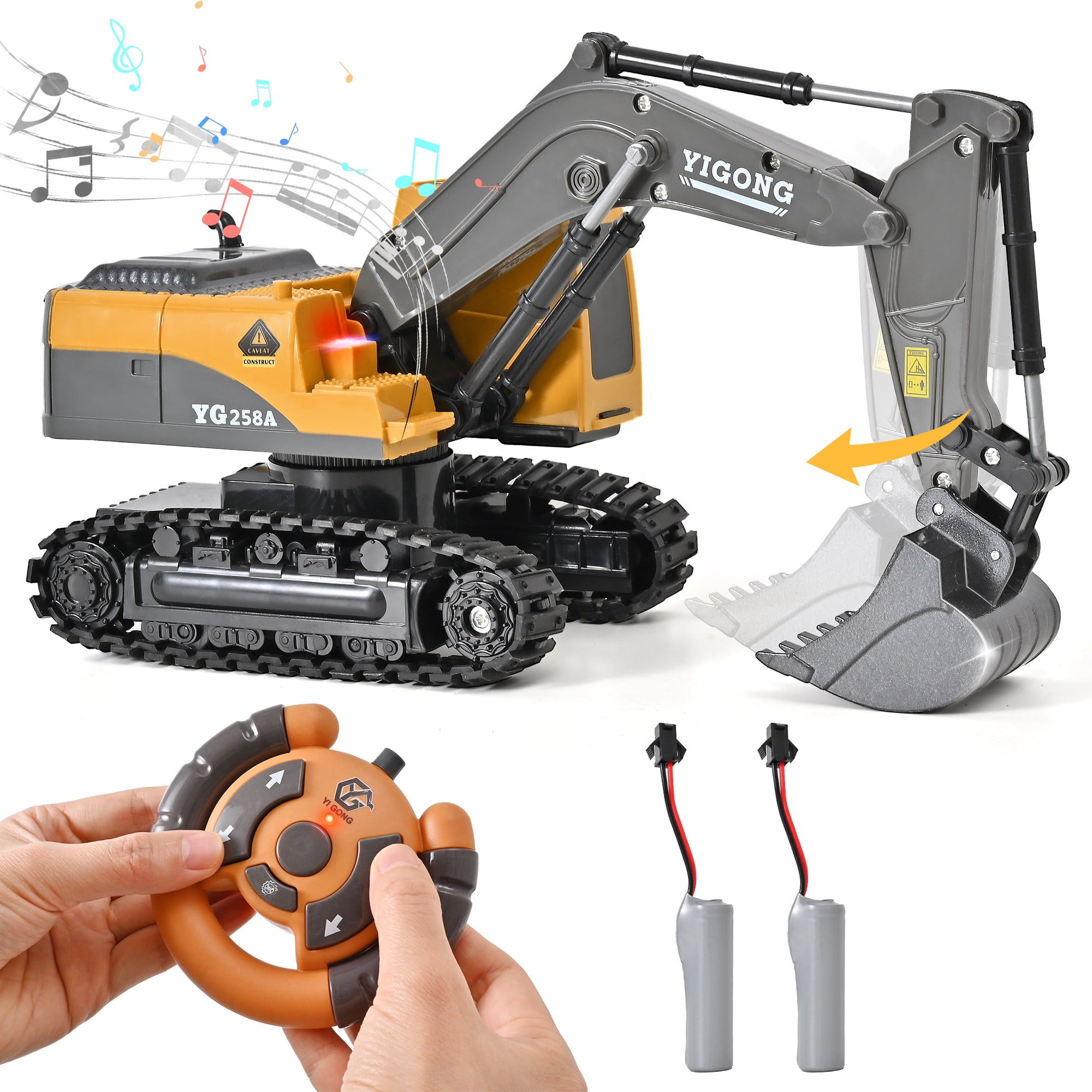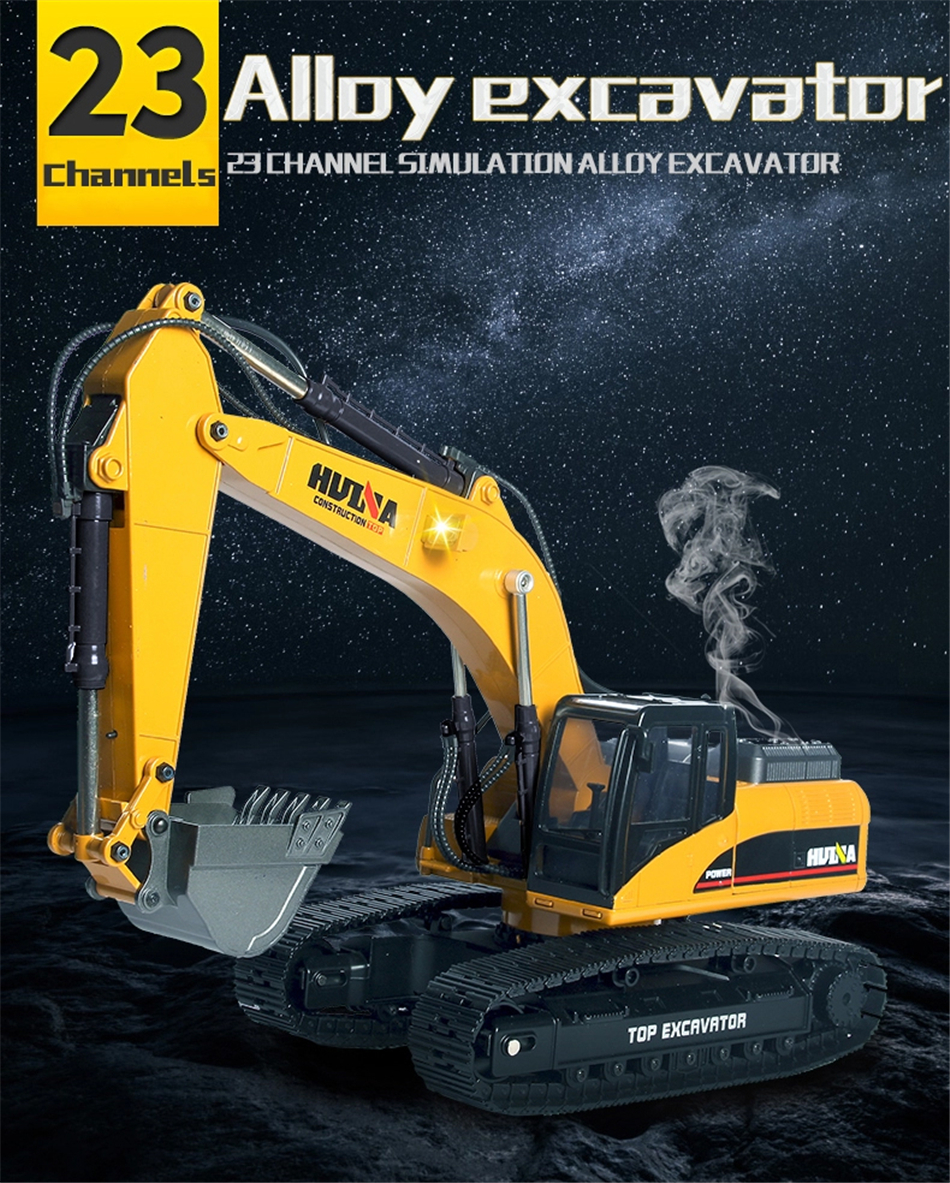The Future of Excavation: Why a rc excavator is Here to Stay
Wiki Article
Understanding Exactly How Excavator Works and Its Effect on Performance
Excavators play a necessary duty in building and construction and mining operations, counting on a complicated interplay of mechanical and hydraulic systems. Their capability to carry out a variety of jobs rests on both their layout and the modern technology incorporated within. Comprehending these parts can considerably influence functional efficiency and performance. As developments remain to reshape the market, one must think about just how these modifications will influence future methods and performance.The Essentials of Excavator Mechanics

The Role of Hydraulic Equipments in Excavators
At the heart of excavator operation exists the hydraulic system, which plays a pivotal duty in powering the machine's functions and activities. This system uses pressurized hydraulic fluid to transfer power, enabling various activities such as excavating, moving, and lifting. By utilizing the concepts of hydraulics, excavators can do jobs with impressive precision and force, improving overall functional efficiency.The hydraulic system includes vital parts, consisting of cyndrical tubes, pumps, and valves, which function together to manage the flow and direction of the liquid. When the operator engages the controls, the hydraulic fluid is directed to certain cylinders, converting the driver's commands into physical activity. This device permits smooth and responsive activities, which are vital in construction and excavation settings. double e volvo rc excavator. The efficiency of the hydraulic system directly influences the productivity and versatility of the excavator, making it an important element in contemporary excavation proceduresKey Elements of an Excavator
Comprehending the vital elements of an excavator is important for grasping how this powerful device runs. An excavator is composed of a number of significant components, including the undercarriage, residence, arm, container, and boom. The undercarriage provides stability and wheelchair, often featuring wheels or tracks to browse numerous terrains. Your home has the engine and hydraulic systems, enabling the driver to control activity and power the equipment. The boom extends from your home, allowing upright reach, while the arm links to the container, facilitating digging and lifting operations.Additionally, the cab houses the operator, geared up with controls for accurate handling. Each of these components plays a crucial role in the excavator's general performance, adding to its performance and performance on building websites. Comprehending these parts helps in optimizing and maintaining excavator performance, ensuring tasks are finished safely and successfully.Attachment Convenience and Its Advantages
Attachment flexibility is a crucial aspect of excavators, enabling drivers to switch between various devices tailored for details jobs. This flexibility not just enhances task effectiveness yet likewise adds to cost-effectiveness by reducing the demand for several devices. Understanding the different sorts of add-ons available can significantly affect the total efficiency and capability of an excavator on job websites.Kinds of Attachments
While excavators are largely identified for their excavating capacities, their real flexibility exists in the wide array of accessories offered. These attachments boost the excavator's functionality, allowing it to do numerous tasks past excavation. Common add-ons consist of pails (for digging and scooping), hydraulic thumbs (for grasping products), and augers (for piercing openings) Grapples are utilized for taking care of and moving debris, while rippers can separate hard surface areas. Other specialized accessories, such as plates and rakes, make it possible for excavators to adapt to details task requirements. This diversity not just boosts the device's utility across different fields, consisting of building and construction, landscape design, and demolition, but also allows drivers to tailor their tools to fulfill details project needs efficiently.Increased Work Efficiency
Maximizing work efficiency is a main benefit of using numerous excavator accessories. Different add-ons permit an excavator to execute numerous jobs without needing to change tools, saving useful time and labor. For instance, using a hydraulic hammer can damage concrete while a container attachment can dig deep into soil, enabling a seamless process. This adaptability reduces downtime linked with equipment changes and improves performance on-site. Furthermore, specialized attachments improve precision in tasks such as grading or landscaping, resulting in higher high quality results. The ability to adjust to various task demands not just enhances procedures but additionally decreases the demand for extra equipment, guaranteeing that tasks are completed swiftly and successfully. Overall, accessory flexibility considerably adds to raised task effectiveness in excavation job.Cost-Effectiveness and Adaptability
Cost-effectiveness is a considerable benefit of making use of versatile excavator accessories. These add-ons permit a single excavator to execute several jobs, lowering the need for added machinery and labor - double e volvo rc excavator. By switching over between buckets, hammers, and grapples, drivers can tackle numerous tasks, from excavating to demolition, therefore making the most of equipment utilization. This versatility not only decreases functional expenses yet also lessens downtime related to transforming tools. Furthermore, the capacity to customize excavators with specialized attachments enhances productivity, as they can successfully handle varied tasks according to job needs. In conclusion, the mix of cost-effectiveness and adaptability in excavator accessories adds to improved operational efficiency and resource allocation in building and excavation projects
Advanced Technology in Modern Excavators
Modern excavators are increasingly equipped with innovative technology that go to website changes excavation procedures. Automation enhances procedures, while enhanced fuel efficiency reduces operational prices. Additionally, smart control systems enhance precision and safety, marking a substantial advancement in excavation tools.Automation in Excavation Processes
As excavation modern technology develops, automation has arised as an important element in boosting efficiency and accuracy on job sites. Modern excavators are geared up with advanced automated systems that assist in tasks such as grading, excavating, and trenching with marginal driver treatment. These systems utilize sensing units, GPS, and artificial intelligence algorithms to ensure precise positioning and depth control, substantially lowering the margin for error. Additionally, automation permits operators to focus on tactical decision-making as opposed to hand-operated controls, leading to boosted performance in general. Such developments not just enhance process but likewise enhance safety and security by lessening human mistake in complicated operations. The assimilation of automation in excavation processes stands for a significant improvement in construction innovation, driving the market towards better efficiency and efficiency.Enhanced Gas Effectiveness
Advancements in modern technology have also led to significant renovations in gas efficiency for contemporary excavators. Modern makers are equipped with innovative engines that maximize power output while minimizing fuel intake. These engines use ingenious combustion technologies, such as turbocharging and straight gas shot, to boost efficiency and effectiveness. Additionally, light-weight products in building minimize overall weight, permitting less energy expense during operation. The intro of variable rate controls enables operators to adjust engine efficiency according to particular jobs, even more decreasing gas use. Therefore, these improvements not only reduced operational expenses however likewise contribute to ecological sustainability by reducing exhausts. Generally, boosted fuel effectiveness in excavators is a crucial growth that bolsters productivity and financial feasibility in the building industry.Smart Control Equipment
While operators browse significantly complicated task sites, wise control systems in excavators have become essential devices for improving performance and precision. These sophisticated technologies utilize formulas and sensing units to keep an eye on numerous specifications such as lots weight, terrain problems, and operational efficiency. By immediately readjusting hydraulic features, clever systems enhance machine efficiency, causing improved efficiency and minimized wear on components. Additionally, operators take advantage of instinctive interfaces that supply real-time feedback and diagnostics, enabling for educated decision-making. This combination of innovation not only streamlines operations however also decreases human mistake, adding to much safer job settings. As the building market continues to advance, smart control systems will certainly play an important duty in shaping the future of excavator performance and effectiveness.Enhancing Operational Effectiveness With Excavators
Excavators play an important function in boosting operational performance throughout various building and excavation jobs. Their flexibility permits for numerous jobs, including training, material, and digging handling, which enhances operations and decreases the requirement for additional devices. With powerful hydraulic systems, excavators can carry out sturdy jobs with accuracy, substantially decreasing the time required to full tasks. The integration of innovative technology, such as general practitioner and automated controls, better enhances their operation, making it possible for operators to attain greater accuracy and minimize material waste. Additionally, modern-day excavators are developed to eat less fuel and lessen emissions, adding to both expense savings and ecological sustainability. By utilizing excavators effectively, construction groups can enhance performance, fulfill project due dates, and boost general website administration. This multifunctionality and effectiveness make excavators vital tools click here for more info in the modern building and construction landscape.The Future of Excavators in Construction and Mining Industries
As the construction and mining sectors develop, the future of excavators is poised for substantial improvement driven by technological advancement and transforming operational demands. Breakthroughs in automation and artificial knowledge are improving excavator capacities, permitting enhanced precision and performance in procedures. Independent excavators are arising, lowering the demand for human treatment and minimizing the threat of accidents.Moreover, the integration of telematics and IoT technology makes it possible for real-time tracking of device performance and predictive maintenance, enhancing uptime. Green styles, consisting of hybrid and electric models, are getting traction, lining up with sustainability goals within the industry.Additionally, using innovative products and lighter styles improves gas effectiveness while keeping performance standards. As these patterns development, excavators will play a vital function in fulfilling the enhancing demands for performance and safety and security in building and construction and mining, ultimately changing operational landscapes.Regularly Asked Inquiries
How Do Weather Influence Excavator Performance?

Climate condition significantly influence excavator efficiency, as rain and mud can impede traction and stability, while severe temperature levels may affect hydraulic systems. Operators must adjust to these variables to ensure excellent capability and security throughout procedures.
What Precaution Should Operators Adhere To While Utilizing Excavators?
Precaution for excavator drivers include putting on appropriate personal safety tools, carrying out pre-operation assessments, making certain proper communication with ground employees, preserving a safe range from above risks, and sticking to recognized functional procedures to prevent accidents.How Frequently Should Excavators Be Kept for Ideal Efficiency?
Excavators should be kept routinely to guarantee peak efficiency, generally every 250 operating hours or as defined by the producer. Regular checks boost integrity, stop unexpected break downs, and extend the lifespan of the equipment.
What Is the Typical Lifespan of an Excavator?
The ordinary life expectancy of an excavator commonly varies from 10,000 to 15,000 hours of operation. Factors affecting longevity include maintenance practices, operating problems, and the top quality of the machine look at more info itself, affecting overall productivity and effectiveness.
Can Excavators Run on Unequal Terrain Properly?
Excavators can operate efficiently on irregular terrain as a result of their verbalized styles and flexible tracks. These functions permit them to preserve security and traction, making it possible for efficient operation in challenging settings commonly encountered in building and construction and landscaping projects. Each of these components plays an important function in the excavator's general functionality, contributing to its effectiveness and effectiveness on building and construction websites. Making the most of job efficiency is a key benefit of using different excavator attachments. While operators navigate significantly complicated task websites, wise control systems in excavators have actually emerged as vital tools for improving performance and accuracy. Excavators play a crucial role in enhancing operational performance across different building and construction and excavation tasks. Advances in automation and man-made intelligence are improving excavator capabilities, allowing for improved accuracy and effectiveness in operations.Report this wiki page